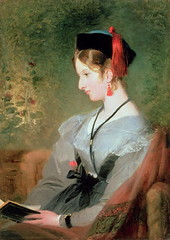 Villette / Charlotte Brontë
Villette / Charlotte BrontëHertfordshire : Wordsworth Classics, 1993
Originally published: 1853
513 p.
I recognize that the graphic to the right isn't a book cover. It's because I couldn't find the actual cover to my edition anywhere, but I loved the portrait on it so much that I decided it would do without the title and such. It complements the novel perfectly. The painting is called Lady Dyke by Sir Edwin Landseer, and I suggest you do not do a Google image search for it while at work unless you use the painter's name.
I've mentioned before, but I read this along with a group of people at The Valve, though I didn't participate in any of the discussions because I was intimidated and consistently 80 pages behind. But the people there had many insightful things to say that instilled in me a great sense of admiration towards this book.
Without going too far into the plot, Villette is from the perspective of Lucy Snowe, a character whose past we know very little of except that something apparently tragic happened in her childhood. Some readers speculate child abuse, but Lucy never shares it with us. Inspired by the her own tenure as a teacher in Belgium, Brontë has Lucy leave her godmother's to travel to France and become an English teacher at a girls' boarding school.
Two major themes of the novel are secrecy and repression, two traits Lucy herself possesses. What makes the story fascinating is that it's told from her perspective, and she noticeably leaves things out of the narrative, some of which is important, and most of which is never revealed. Contrasts with the characters like the coquettish Ginevra Fanshawe and the charming and intelligent Polly de Bassompierre reveal further Lucy's detachment and inability to become a happy, social woman like her peers. She rejects the playful banter and florid dressings of her contemporaries and lives quietly, keeping at a distance her feelings for her godbrother Graham and her colleague Paul Emmanuel, though she eventually does recognize her love for the latter.
It sounds though it would be difficult to sympathize with a character like Lucy, but I personally found myself identifying with her quite a bit. We've all got a part of ourselves that nobody (we think) will truly understand. And there are times when everyone feels they are observing the world through a disconnected filter, watching people around them embrace experiences they themselves can never understand. Lucy comes across modern in her intelligence and if not understandable, then relatable in her interpersonal constriction.
This novel is incredibly complex and can be interpreted in many ways. With elements of the real, fantastical, psychological, and gothic, is a thought-provoking and beautifully-written piece that can be enjoyed on many levels and through multiple readings.




No comments:
Post a Comment